News
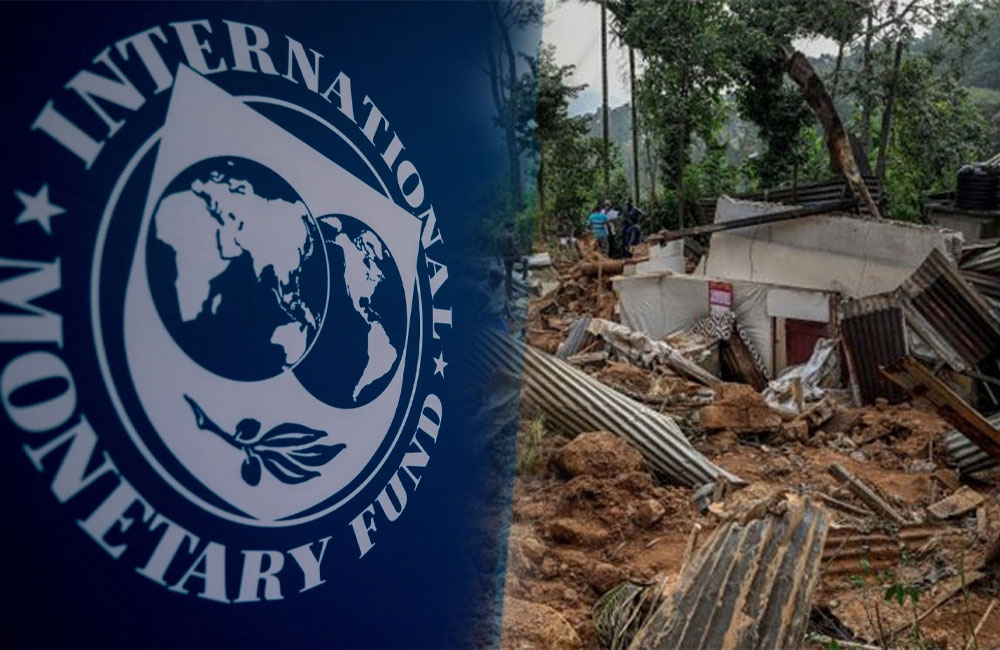
Cyclone Pressure Tests Sri Lanka’s Ability to Meet IMF Conditions
Beyond the immediate economic damage, Cyclone Ditwah has exposed the growing difficulty Sri Lanka faces in meeting IMF benchmarks and reform conditions while responding to an escalating climate crisis.
The IMF’s latest assessment acknowledges that Sri Lanka entered the disaster with stronger macroeconomic fundamentals than in previous years. Inflation was subdued, reserves had stabilised, and growth momentum had returned. However, the cyclone has fundamentally altered the policy landscape, forcing the Government to juggle fiscal discipline with urgent humanitarian and reconstruction needs.
One of the most immediate challenges lies in public finance management. Emergency relief, housing reconstruction, and infrastructure repair will inevitably increase spending pressures at a time when the IMF programme demands strict expenditure control, revenue mobilisation, and primary surplus targets. While the Fund supports temporary disaster-related spending, it has made clear that transparency, procurement discipline, and adherence to fiscal rules are non-negotiable a tall order given Sri Lanka’s past record of weak oversight during emergencies.
Capacity constraints represent another binding limitation. Administrative resources are now being diverted toward disaster response, potentially delaying structural reforms, tax administration upgrades, and state-owned enterprise restructuring all key IMF benchmarks. The Fund itself flagged this risk, warning that reform momentum could slow just when consistency is most needed to anchor investor confidence.
Externally, the cyclone compounds existing vulnerabilities. Higher import demand for food, fuel, and construction materials threatens to widen the current account deficit, while tourism disruptions and export losses weaken inflows. At the same time, global risks — including potential renewed US trade tariffs, geopolitical tensions, and volatile energy prices — could further undermine projections underpinning the IMF programme.
Inflation management also becomes more complex. Food shortages and supply-chain disruptions are already feeding into prices, increasing the likelihood of inflation overshooting targets. Tightening monetary policy to contain inflation risks slowing growth further, while loosening it could undermine programme credibility a delicate balancing act for policymakers.
Yet the IMF assessment is not without constructive signals. The Fund projects that growth could recover to around 3.1% by 2027, with inflation easing and external balances improving as agriculture and tourism rebound. Reconstruction, if well-managed, could even strengthen climate resilience and productivity.
The central challenge, therefore, is execution. Meeting IMF conditions amid a climate shock requires not just compliance, but institutional strength, political discipline, and policy coherence. Failure to manage this balance risks turning a temporary natural disaster into a prolonged economic setback.
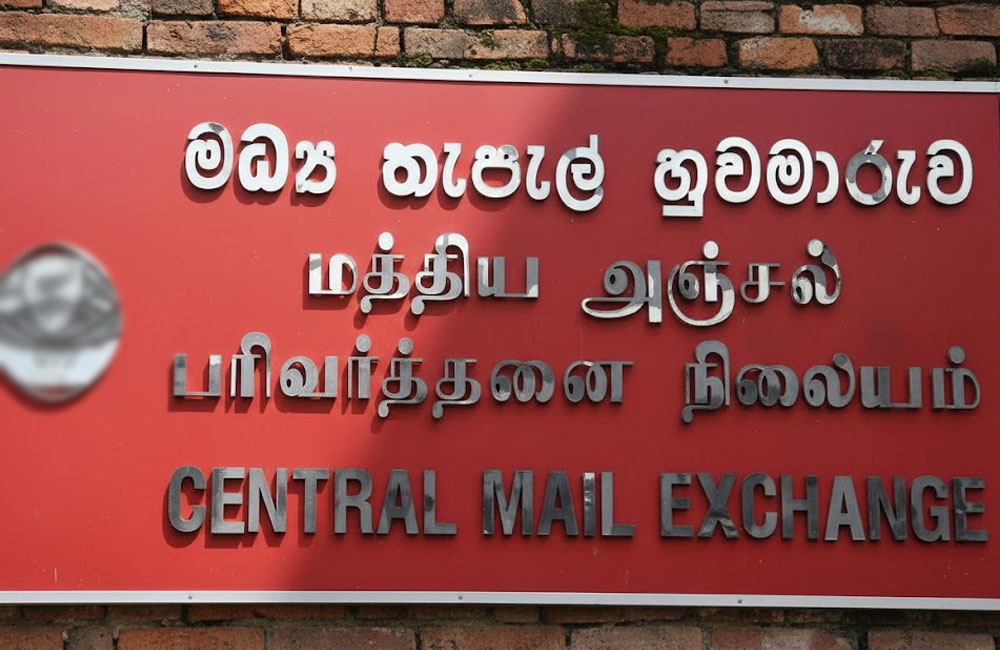
Customs Seize Rs. 60M ‘Kush’ Shipment at Central Mail Exchange
Sri Lanka Customs officers have uncovered a large consignment of ‘Kush’ narcotics valued at more than Rs. 60 million concealed inside a parcel at the Central Mail Exchange, authorities said.
The package, which had been sent from Thailand, was intercepted during a targeted inspection carried out by Customs officials. A 31-year-old man from Dematagoda was arrested in connection with the smuggling attempt.
Customs Director and Media Spokesman Chandan Punchihewa said the total weight of the seized narcotics amounted to 6 kilograms and 201 grams. The detection was made as part of a special operation aimed at identifying high-risk shipments entering the country.
In a separate incident, Punchihewa also revealed that Customs officers discovered a consignment of illegally imported turmeric during an inspection at the Orugodawatta Customs Yard. The container was examined by the Operations Division of the Customs Preventive Unit.
He added that the value of the seized turmeric stock is yet to be assessed, and further investigations into both cases are currently underway.

Cyclone Ditwah’s True Economic Cost May Exceed Rs. 2.5 Trillion
Cyclone Ditwah’s immediate physical destruction estimated at $4.1 billion or roughly Rs. 1.3 trillion by the World Bank may represent only the first layer of a far larger economic shock, with indirect losses and delayed recovery costs likely to push total damage beyond Rs. 2.5 trillion, analysts warn.
The Global Rapid Post-Disaster Damage Estimation (GRADE) report captures direct damage to infrastructure, housing, agriculture, and public facilities, amounting to nearly 4% of national GDP. However, it excludes lost income, business disruption, productivity decline, and the full fiscal cost of recovery factors that often exceed the initial damage bill.
“Direct damage is only the visible tip of the economic iceberg,” said a Colombo-based macroeconomist involved in disaster-impact modelling. “International experience shows that indirect losses typically match or exceed physical damage when recovery is slow.”
Applying a conservative 1:1 loss multiplier, commonly used by multilateral lenders in post-disaster assessments, Sri Lanka’s total economic exposure could reach Rs. 2.6 trillion, once stalled output, agricultural income losses, emergency spending, and reconstruction delays are incorporated.
Infrastructure damage alone estimated at Rs. 550 billion has disrupted transport corridors, irrigation networks, and water systems. Each month of delayed repairs compounds losses across agriculture, trade, and logistics. Agriculture, already weakened by climate stress, has sustained Rs. 260 billion in direct damage, threatening planting cycles and food supply stability.
Housing damage of Rs. 315 billion has created a parallel fiscal burden. If even 200,000 severely affected households receive compensation averaging Rs. 1 million, the state faces an immediate Rs. 200 billion liability, excluding reconstruction of schools, hospitals, and public assets.
Disaster-risk analysts argue that governance gaps are magnifying the economic impact. “Recovery speed depends less on money than on decision quality,” noted a regional disaster-risk specialist. “Fragmented policy coordination and weak high-level communication with development partners slow financing and inflate costs.”
While the World Bank has mobilised $120 million from existing projects, this represents a fraction of needs. Analyst’s stress that effective recovery will require clear fiscal signalling, credible economic data, and skilled engagement with international financiers capacities that must be strengthened urgently.
Cyclone Ditwah has underscored a hard lesson: climate disasters are now macroeconomic events, demanding institutional readiness equal to their scale.
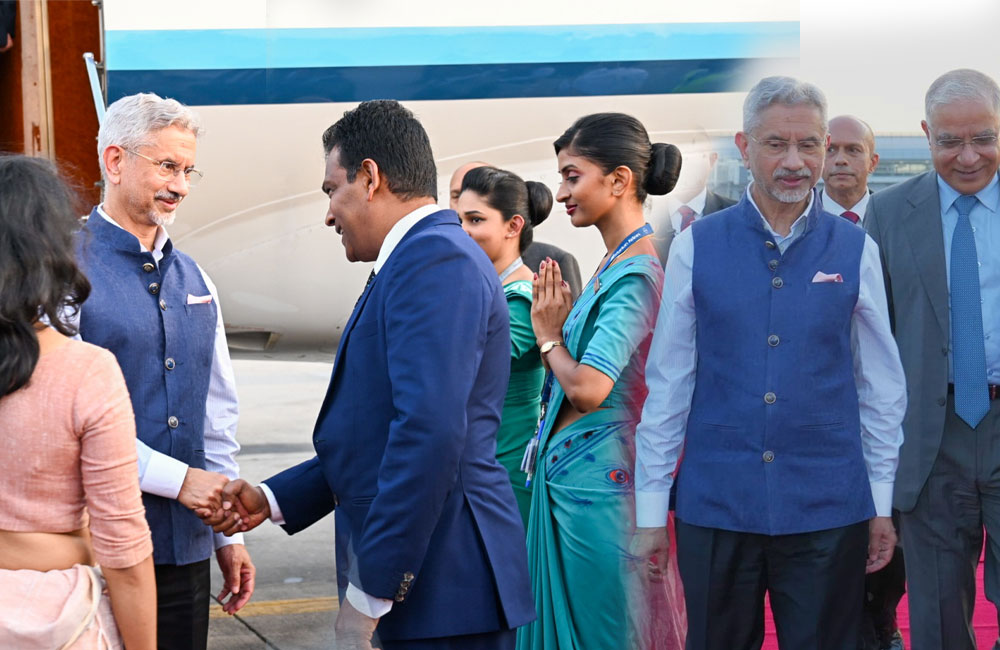
India Pledges USD 450M Recovery Support Package for Sri Lanka
India has pledged a USD 450 million reconstruction and recovery assistance package to support Sri Lanka’s post-disaster rebuilding efforts, Indian External Affairs Minister Dr. S. Jaishankar announced today.
Speaking at a joint media briefing, Dr. Jaishankar said he personally handed over a letter from Indian Prime Minister Narendra Modi to President Anura Kumara Dissanayake, formally conveying India’s commitment.
He explained that the proposed assistance comprises a USD 350 million concessional line of credit, along with USD 100 million in grant funding, aimed at supporting Sri Lanka’s recovery process.
Dr. Jaishankar noted that he held detailed discussions with the President on the extent of the damage caused by Cyclone Ditwah, with particular focus on ensuring the swift and effective delivery of the pledged support.
The announcement underscores India’s continued support for Sri Lanka during times of crisis and its commitment to strengthening bilateral cooperation.
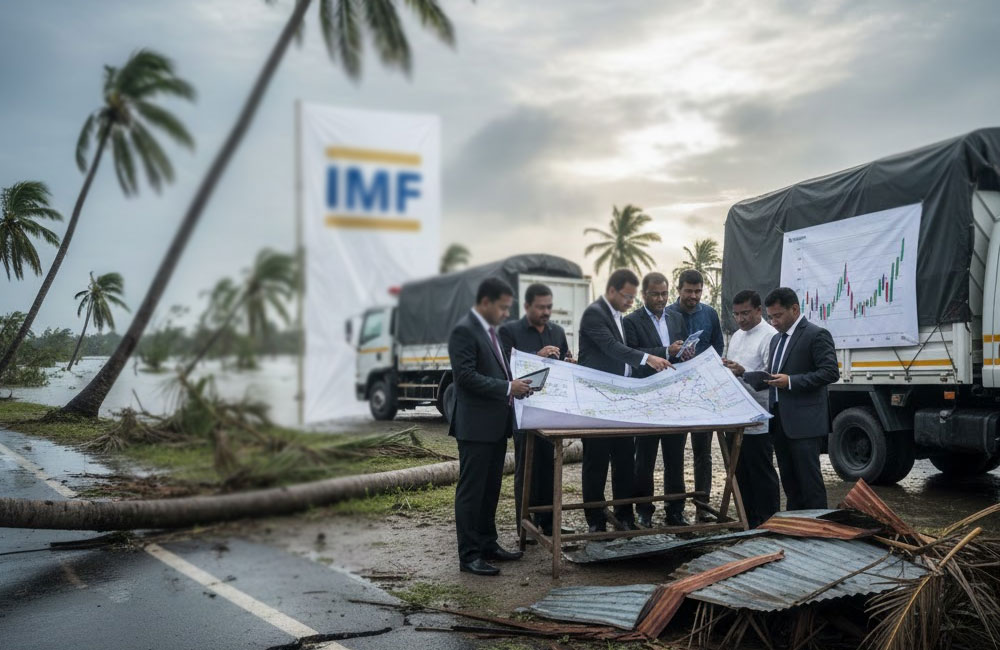
IMF Emergency Funds: Relief or Repackaged Debt Pressure?
Sri Lanka’s decision to tap the International Monetary Fund’s Rapid Financing Instrument (RFI) following the devastation caused by Cyclone Ditwah has been presented by the Government as a timely and low-cost lifeline. Finance and Planning Deputy Minister Dr. Anil Jayantha Fernando has argued that the IMF’s approval of approximately US$206 million offers emergency balance-of-payments relief at an exceptionally low and transparent interest rate. However, a closer examination of the facility raises important questions about cost, sustainability, and longer-term fiscal implications.
Cyclone Ditwah struck the island on November 28, inflicting widespread human and economic damage. With over 600 lives lost, tens of thousands displaced, and critical infrastructure destroyed, the immediate humanitarian and reconstruction needs are undeniable. In this context, the IMF’s rapid financing appears to provide short-term breathing space for an economy still emerging from its worst crisis in decades.
Yet, while Dr. Fernando has emphasised the RFI’s headline interest rate of around 3.27%, linked to the IMF’s Special Drawing Rights (SDR) framework, this figure does not fully capture the effective cost over time. IMF lending terms are not static. Interest rates fluctuate weekly, and additional surcharges can apply depending on the size and duration of borrowing relative to Sri Lanka’s IMF quota. These surcharges potentially rising by up to 200 basis points may not be immediate, but they are neither hypothetical nor rare.
Moreover, the RFI is designed as a short-term emergency instrument with a repayment window of three to five years. While suitable for shock absorption, it also adds to Sri Lanka’s already strained external debt obligations at a time when fiscal buffers remain thin. Emergency funding may ease immediate balance-of-payments stress, but it does not generate foreign exchange earnings or address structural weaknesses in revenue, productivity, or disaster resilience.
Dr. Fernando has also framed the RFI as a confidence-building tool, warning against “misinformation” undermining recovery momentum. However, transparency requires acknowledging both benefits and risks. IMF emergency financing, even when fast-disbursing and lightly conditioned, still reinforces reliance on external borrowing rather than domestic resource mobilisation or risk-pooling mechanisms such as disaster insurance.
Alongside IMF support, the Government has announced temporary domestic relief measures, including three- to six-month loan repayment extensions for affected businesses and the introduction of concessional credit facilities through licensed banks. While these measures may ease short-term cash flow constraints, their effectiveness will depend on consistent implementation and the banking sector’s willingness to absorb risk without transferring costs back to borrowers later.
In sum, while the IMF’s RFI provides urgently needed liquidity after Cyclone Ditwah, portraying it as unequivocally “low-cost” risks oversimplifying a complex financial reality. Emergency relief is necessaryand it is not free, and it is not a substitute for long-term economic resilience.
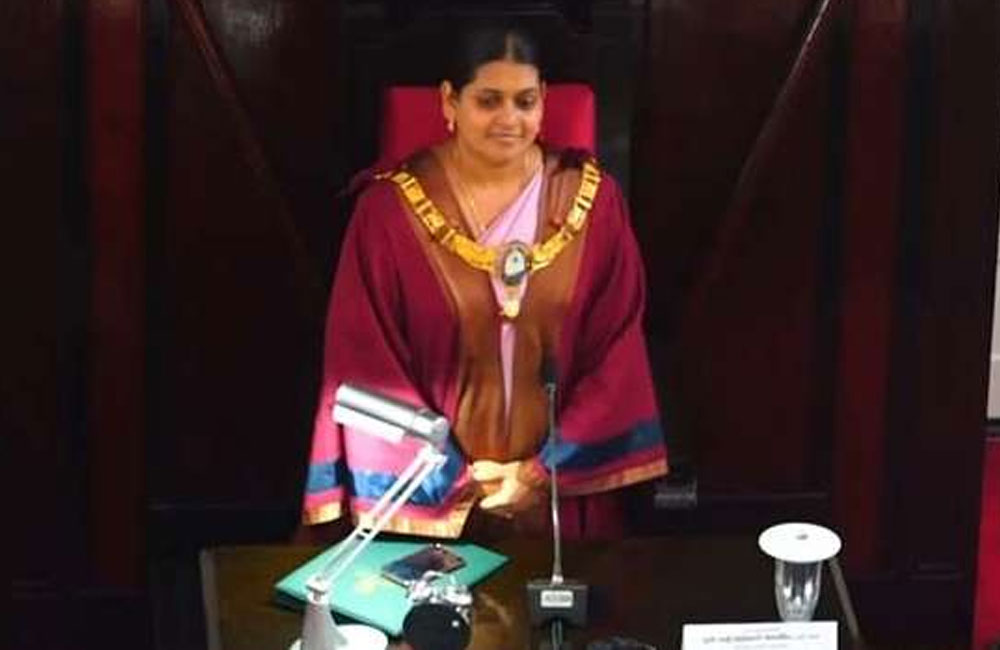
Colombo Mayor Urges Councillors to Reflect After Budget Vote Loss
In the wake of the Colombo Municipal Council (CMC) budget being voted down, Colombo Mayor Vraie Cally Balthazar appealed to councillors to engage in serious self-reflection over their decision.
Addressing the council, the Mayor said that the budget’s defeat was not a loss for the institution, but rather a failure of personal accountability. She urged members to consider whether their actions aligned with their conscience and the responsibilities entrusted to them.
Despite the outcome, Mayor Balthazar said she remains committed to working collaboratively with CMC members and municipal staff, expressing hope for continued cooperation in serving the residents of Colombo.
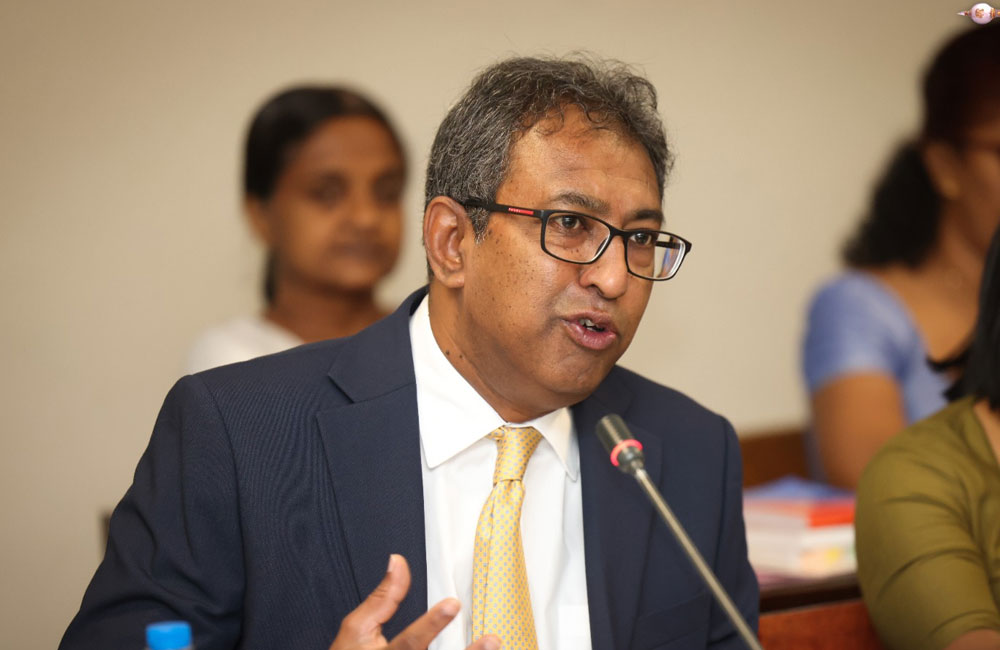
COPF Chair Urges President to Appoint Auditor General Amid Post-Disaster Concerns
Chairman of the Committee on Public Finance (COPF), MP Harsha de Silva, has formally raised concerns with President Anura Kumara Dissanayake over the lack of an Auditor General at a critical post-disaster juncture, describing the situation as deeply troubling.
In a letter addressed to the President, MP de Silva pointed out that the government has already established the ‘Rebuilding Sri Lanka Fund’, but questioned how financial accountability can be ensured in the absence of an Auditor General. He stressed that effective auditing would only be possible if the fund is formally brought under parliamentary oversight and monitored by a duly appointed Auditor General.
Highlighting constitutional provisions, de Silva reminded the President that authority over public finances rests with Parliament under Article 148 of the Constitution. He therefore urged the immediate appointment of an Auditor General to safeguard transparency and fiscal discipline, particularly in relation to disaster recovery funds.
Speaking to the media, de Silva said he had been informed by the President’s Secretary that the letter had been received, but noted that no action has been taken so far. He added that the concerns were conveyed following consultations with other members of the COPF.
The issue has gained urgency following the expiration of the acting Auditor General’s term on December 6. Efforts to appoint a permanent Auditor General have stalled after several nominees proposed by the President were rejected by the Constitutional Council, leaving the key oversight position vacant.

Free Sanitary Napkin Scheme to Cover All Schools Nationwide from 2026
The Ministry of Education has decided to roll out its sanitary napkin assistance programme to all schools across the island from 2026, significantly expanding a scheme aimed at improving menstrual hygiene among schoolgirls.
Prime Minister and Minister of Education, Higher Education and Vocational Education, Dr. Harini Amarasuriya, said the nationwide expansion will benefit over one million female students above Grade 6. The announcement was made during a meeting on schoolgirls’ hygiene held at the Ministry on December 22, attended by Deputy Minister Dr. Madura Seneviratne.
Launched in 2024, the programme initially focused on girls attending schools in rural, estate and economically disadvantaged areas. Under the expanded plan, the initiative will be extended to every school in the country, supported by a government allocation of Rs. 1.44 billion.
Eligible students will receive an annual voucher valued at Rs. 1,440, which can be used to purchase sanitary napkins. Distribution will be coordinated through Provincial Education Offices, ensuring access at the school level.
To ensure safety and quality standards, sanitary products supplied under the scheme will be sourced exclusively from institutions registered and certified by the Sri Lanka Standards Institution (SLSI).
Addressing officials at the meeting, Dr. Amarasuriya emphasized the importance of allowing students the freedom to select products that best suit their individual needs. She also called for voucher and distribution systems that account for geographical differences and encouraged the adoption of environmentally responsible disposal practices within schools.
The discussion was attended by Education Ministry Secretary Nalaka Kaluwewa and other senior ministry officials.
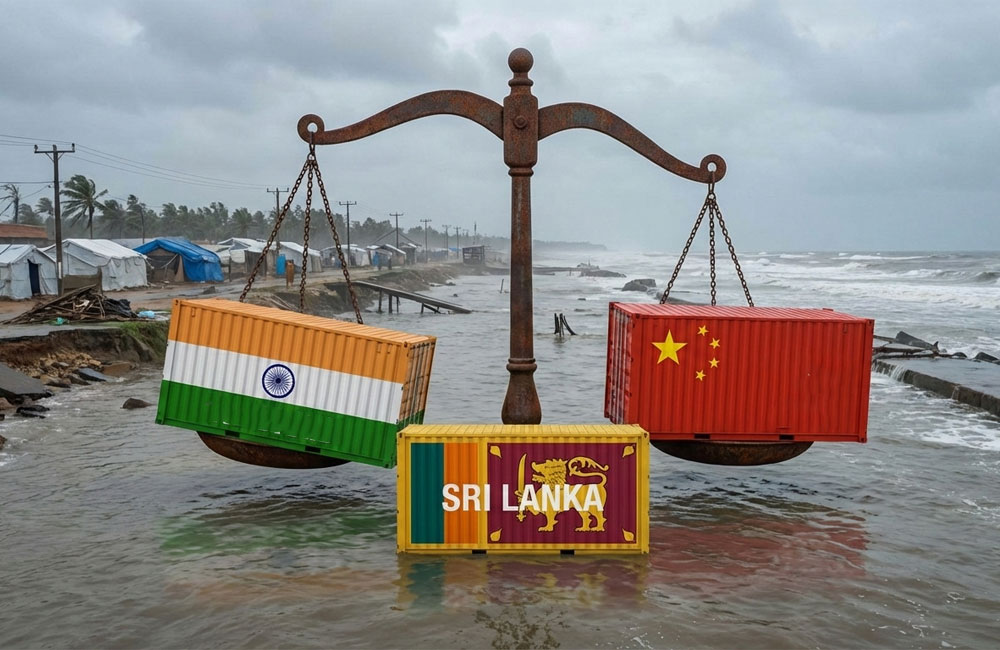
Cyclone Aid or Strategic Signal? India, China and Sri Lanka’s Balancing Act
India’s USD 450 million reconstruction package for cyclone-hit Sri Lanka arrives at a critical geopolitical moment, raising questions about whether disaster assistance is also becoming a strategic signal in the intensifying competition for influence in the Indian Ocean.
While the humanitarian dimension of India’s response to Cyclone Ditvah is undeniable—marked by rapid deployment of naval vessels, air assets, medical teams, and relief supplies the scale, speed, and political framing of the package indicate broader strategic intent. Dr. S. Jaishankar’s role as Special Envoy of Prime Minister Narendra Modi and the formal transmission of a letter to President Anura Kumara Dissanayake elevate the assistance from routine aid to high-level diplomatic engagement.
The package, comprising USD 350 million in concessional credit and USD 100 million in grants, is designed to rebuild infrastructure, housing, health and education systems, agriculture, and disaster preparedness. These sectors are not only socially vital but strategically sensitive, shaping long-term connectivity and economic resilience.
India’s swift intervention under Operation Sagar Bandhu contrasts with Sri Lanka’s earlier experience of slower, project-driven assistance from other partners. Over 1,100 tons of relief supplies, emergency medical units, and bridge construction efforts underscore India’s operational readiness in the region.
However, the geopolitical subtext is difficult to ignore. Sri Lanka remains a focal point of competition between India and China, particularly following years of heavy Chinese lending for ports, highways, and energy projects. As Colombo undergoes debt restructuring and recalibrates its external relationships, disaster assistance has become another arena for influence.
India’s emphasis on grants, concessional credit, and rapid execution positions its aid as less financially burdensome than traditional large-scale infrastructure loans. This approach implicitly contrasts with criticism surrounding debt sustainability linked to some past Chinese-funded projects, even as Beijing continues to explore ways to reassert its presence through alternative financing and development support.
Politically, New Delhi’s message is clear: India intends to be Sri Lanka’s most dependable partner during crises, not only in economic recovery but also in safeguarding regional security. The deployment of major naval assets reinforces India’s maritime reach and its vision of the Indian Ocean as a shared security space.
For Sri Lanka, the challenge lies in leveraging Indian assistance without becoming overly dependent or entangled in great-power rivalry. Colombo must balance immediate reconstruction needs with long-term strategic autonomy, ensuring that humanitarian aid does not translate into geopolitical pressure.
Ultimately, India’s cyclone assistance reflects both solidarity and strategy. As climate-related disasters intensify across the region, relief diplomacy is likely to become an increasingly prominent and contested tool in shaping the future balance of power in the Indian Ocean.
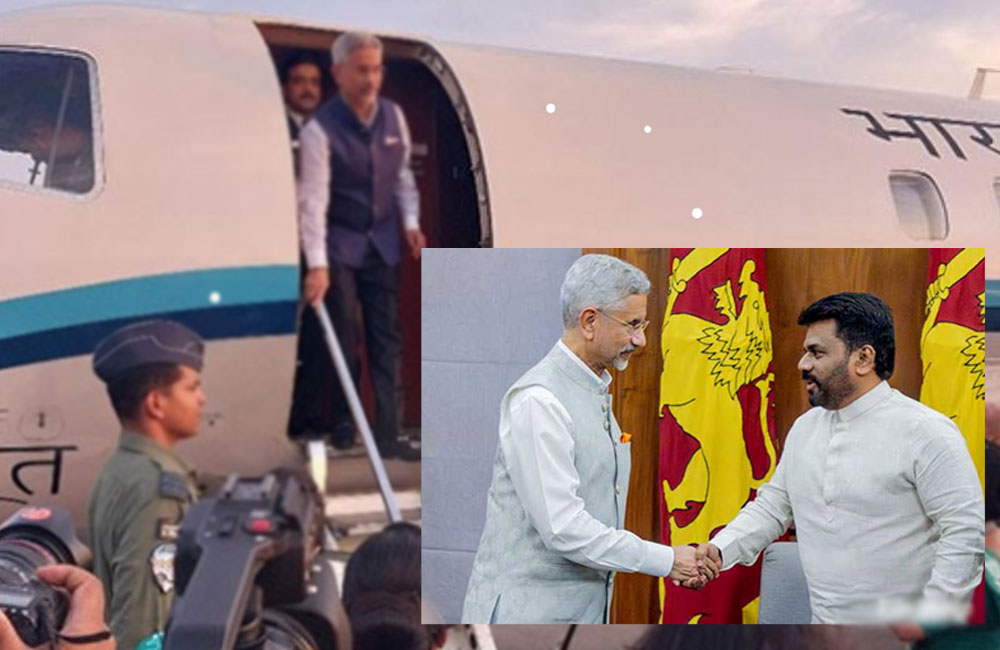
Indian External Affairs Minister Holds Talks with President Dissanayake
India’s Minister of External Affairs, Dr. S. Jaishankar, met with President Anura Kumara Dissanayake today in a meeting aimed at further strengthening relations between Sri Lanka and India.The President’s Media Division confirmed that bilateral talks are presently in progress, with discussions focusing on areas of mutual interest and cooperation between the two countries.
The meeting is viewed as a significant engagement in the continued diplomatic dialogue between Colombo and New Delhi.

Heightened Security Rolled Out Nationwide for Christmas and New Year Festivities
Sri Lanka Police, together with the Ministry of Defence, have rolled out an enhanced security plan covering major cities, places of worship, hotels and tourist areas to ensure public safety during the Christmas and New Year season.
Under the initiative, the Inspector General of Police (IGP) has instructed all police stations to step up security in locations expected to attract large crowds, such as shopping malls, commercial districts and popular public spaces linked to year-end celebrations.
To strengthen law enforcement capacity, an additional 2,500 police officers have been deployed across the Western Province to assist with crowd control and the maintenance of public order.
The security effort is being reinforced by the Special Task Force (STF) and the tri-forces, with intelligence officers and plainclothes personnel stationed in high-traffic commercial areas to monitor and prevent criminal activity.
Police Media Spokesman ASP F. U. Wootler said the IGP has directed all Senior Deputy Inspector Generals, Deputy Inspector Generals and Officers-in-Charge to implement coordinated security and traffic management plans nationwide to ensure a calm and orderly festive period, including the transition into the 2026 New Year.
Particular focus has been placed on Catholic churches islandwide, where Christmas religious services and related events are scheduled. Police are working closely with clergy and event organizers to ensure the safety of worshippers. Heightened security has also been extended to banks, retail outlets, leading hotels, shopping centres and tourist attractions frequented by both locals and foreign visitors.
Authorities have urged the public to remain vigilant and promptly report any suspicious individuals, vehicles or activities to the nearest police station, stressing that public cooperation plays a key role in maintaining security during the festive season.
At the same time, several major hotels have strengthened their internal safety arrangements by tightening access controls and guest screening procedures, while being advised to strictly enforce entry protocols.
Police have also launched special traffic operations aimed at curbing reckless driving and other traffic-related offences, which typically rise during holiday periods.
Army Spokesperson Brigadier Waruna Gamage told the Daily Mirror that the military is on standby to provide assistance to the police when required. He added that a dedicated Operations Room has been established at Army Headquarters to monitor and support public safety efforts throughout the festive season.
According to the Ministry of Defence, the Operations Room will remain operational until the end of the holiday period, serving as a central coordination centre to enhance cooperation between the tri-forces and Sri Lanka Police, improve real-time information sharing and strengthen overall operational preparedness.

Local Gold Rates Jump Rs. 7,000 as Global Prices Surge
Gold prices in Sri Lanka climbed sharply today (23), mirroring a strong upswing in the global gold market, traders said.
Internationally, gold prices rose to USD 4,485 per ounce, prompting a corresponding increase in local prices. Compared to yesterday (22), gold rates in Sri Lanka have gone up by Rs. 7,000.
At the Colombo Pettah gold market, a 22-carat gold sovereign was selling this morning at Rs. 325,600. Meanwhile, the price of a pound of 24-carat gold increased to Rs. 352,000, up from Rs. 344,000 recorded the previous day, market sources confirmed.
Traders attribute the local price hike to sustained global demand and rising international bullion prices.
Page 49 of 684